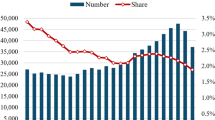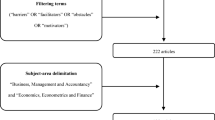Abstract
During the past two centuries, universities have evolved from being “accumulators” of knowledge, largely separated from society, to “knowledge hubs,” which are deeply embedded in systems of innovation and take on the role of instigating economic and social development. Despite economic, social, and institutional disparities, university authorities, policymakers, and academics are focusing their attention on the potential of universities to create innovative environments and contribute to the knowledge-based economic development of countries and regions. Due to the lack of data, almost all extant empirical studies have analyzed the contribution of university research mission on developed regions (e.g., USA, UK, and the Netherlands). The aim of this paper is to provide evidence of the impact of three university missions on the economic development of countries at different stages, namely the factor-, efficiency-, and innovation-driven stages. Adopting the endogenous growth theory, our proposed model was tested using data from 77 countries with a linear regression model. Our main results show that: (i) the human capital generated by universities is the most important predictor of economic development at all stages; (ii) the university research activity is only evidenced at the efficiency-driven and innovation-driven stages; and (ii) the outcome of the entrepreneurial mission of universities is only positively related to gross domestic product (GDP) in innovation-driven economies. Some relevant implications for policymakers, university managers, and society, as well as best practices emerge from this research.

Similar content being viewed by others
Notes
For the purposes of our study, we used the countries’ stages of economic development provided in the Global Competitiveness Report 2011–2012 (Sala-i-Martin and Schwab 2011). Countries that were at one of two transition stages were classified in the previous main stage.
Collinearity statistics can be obtained upon request.
References
Acs, Z., & Szerb, L. (2011). Global entrepreneurship and development index 2011. Cheltenham: Edward Elgar Publishing.
Aidis, R., Estrin, S., & Mickiewicz, T. (2008). Institutions and entrepreneurship development in Russia: a comparative perspective. Journal of Business Venturing, 23, 656–672.
Apanasovich, N. (2014). Modes of innovation: a grounded meta-analysis. Journal of the Knowledge Economy. doi:10.1007/s13132-014-0237-0.
Audretsch, D. B. (2009). The entrepreneurial society. The Journal of Technology Transfer, 34(3), 245–254.
Audretsch, D. B. (2014). From the entrepreneurial university to the university for the entrepreneurial society. The Journal of Technology Transfer, 39(3), 313–321.
Audretsch, D. B., & Keilbach, M. (2004). Entrepreneurship capital and economic performance. Regional Studies, 38(8), 949–959.
Audretsch, D. B., Lehmann, E., & Warning, S. (2004). University spillovers: does the kind of science matter? Industry & Innovation, 11(3), 193–206.
Audretsch, D. B., Leyden, D. P., & Link, A. N. (2013). Regional appropriation of university-based knowledge and technology for economic development. Economic Development Quarterly, 27(1), 56–61.
Bajmócy, Z., Lukovics, M., & Vas, Z. (2010). A subregional analysis of universities’ contribution to economic and innovation performance. Transition Studies Review, 17(1), 134–150.
Benneworth, P., & Charles, D. (2005). University spin-off policies and economic development in less successful regions: learning from two decades of policy practice. European Planning Studies, 13(4), 537–557.
Bercovitz, J., & Feldmann, M. (2006). Entrepreneurial universities and technology transfer: a conceptual framework for understanding knowledge-based economic development. The Journal of Technology Transfer, 31(1), 175–188.
Bilbao-Osorio, B., & Rodriguez-Pose, A. (2004). From R&D to innovation and economic growth in the EU. Growth and Change, 35(4), 434–455.
Bramwell, A., & Wolfe, D. A. (2008). Universities and regional economic development: the Entrepreneurial University of Waterloo. Research Policy, 37(8), 1175–1187.
Clark, B. R. (1998). Creating entrepreneurial universities. Oxford: Pergamon.
Di Gregorio, D., & Shane, S. (2003). Why do some universities generate more start-ups than others? Research Policy, 32, 209–227.
Drucker, J., & Goldstein, H. (2007). Assessing the regional economic development impacts of universities: a review of current approaches. International Regional Science Review, 30(1), 20–46.
Etzkowitz, H., Webster, A., Gebhardt, C., & Terra, B. R. C. (2000). The future of the university and the university of the future: evolution of ivory tower to entrepreneurial paradigm. Research Policy, 29(2), 313–330.
Furman, J. L., Porter, M. E., & Stern, S. (2002). The determinants of national innovative capacity. Research Policy, 31(6), 899–933.
Gibb, A., & Hannon, P. (2006). Towards the entrepreneurial university. International Journal of Entrepreneurship Education, 4(1), 73–110.
Goldstein, H. A., & Renault, C. S. (2004). Contributions of universities to regional economic development: a quasi-experimental approach. Regional Studies, 38(7), 733–746.
Gonzalez-Pernia, J. L., Pena-Legazkue, I., & Vendrell-Herrero, F. (2012). Innovation, entrepreneurial activity and competitiveness at a sub-national level. Small Business Economics, 3, 561–574.
Grimaldi, R., Kenney, M., Siegel, D. S., & Wright, M. (2011). 30 years after Bayh–Dole: reassessing academic entrepreneurship. Research Policy, 40(8), 1045–1057.
Grudzinskii, A. (2005). The university as an entrepreneurial organization. Russian Education & Society, 47(1), 7–25.
Guerrero, M., & Urbano, D. (2012). The development of entrepreneurial university. Journal of Technology Transfer, 37(1), 43–74.
Guerrero, M., & Urbano, D. (2014). Academics’ start-up intentions and knowledge filters: an individual perspective of the knowledge spillover theory of entrepreneurship. Small Business Economics, 43(1), 57–74.
Guerrero, M., Urbano, D., & Fayolle, A. (2014a). Entrepreneurial activity and regional competitiveness: evidence from European entrepreneurial universities. The Journal of Technology Transfer. doi:10.1007/s10961-014-9377-4.
Guerrero, M., Urbano, D., Cunningham, J., & Organ, D. (2014b). Entrepreneurial universities in two European regions: a case study comparison. The Journal of Technology Transfer, 39(3), 415–434.
Guerrero, M., Cunningham, J. A., & Urbano, D. (2015). Economic impact of entrepreneurial universities’ activities: an exploratory study of the United Kingdom. Research Policy, 44(3), 748–764.
Hair, J. F., Black, W., Babin, B., & Anderson, R. (2010). Multivariate data analysis. A global perspective. New Jersey: Pearson Prentice Hall.
Isaksen, A., & Karlsen, J. (2010). Different modes of innovation and the challenge of connecting universities and industry: case studies of two regional industries in Norway. European Planning Studies, 18(12), 1993–2008.
Jaffe, A. B. (1989). Real effects of academic research. The American Economic Review, 79(5), 957–970.
Kirby, D., Guerrero, M., & Urbano, D. (2011). The theoretical and empirical side of entrepreneurial universities: an institutional approach. Canadian Journal of Administrative Sciences, 28(3), 302–316.
Klofsten, M., & Jones-Evans, D. (2000). Comparing academic entrepreneurship in Europe: the case of Sweden and Ireland. Small Business Economics, 14(4), 299–310.
Kwiek, M. (2012). Universities and knowledge production in Central Europe. European Educational Research Journal, 11(1), 111–126.
Laukkanen, M. (2000). Exploring alternative approaches in high-level entrepreneurship education: creating micromechanisms for endogenous regional growth. Entrepreneurship & Regional Development, 12(1), 25–47.
Lazzeretti, L., & Tavoletti, E. (2005). Higher education excellence and local economic development: the case of the entrepreneurial university of twente. European Planning Studies, 13(3), 475–493.
Lederman, D., & Saenz, L. (2005). Innovation and development around the world, 1960–2000. Washington, DC: World Bank.
Leten, B., Landoni, P., & Van Looy, B. (2014). Science or graduates: how do firms benefit from the proximity of universities? Research Policy, 43(8), 1398–412.
Lockett, A., Wright, M., & Franklin, S. (2003). Technology transfer and universities’ spin-out strategies. Small Business Economics, 20(2), 185–200.
Lopez-Claros, A., Schwab, K., & Porter, M. E. (2004). The global competitiveness report 2004–2005: world economic forum. Geneva: Palgrave Macmillan.
Lucas, R. E., Jr. (1988). On the mechanics of economic development. Journal of Monetary Economics, 22, 3–42.
Martin, F. (1998). The economic impact of Canadian university R&D. Research Policy, 27(7), 677–687.
Mathews, J. A., & Hu, M. C. (2007). Enhancing the role of universities in building national innovative capacity in Asia: the case of Taiwan. World Development, 35(6), 1005–1120.
Mowery, D. C., Nelson, R. R., Sampat, N., & Ziedonis, A. A. (2001). The growth of patenting and licensing by US universities: an assessment of the effects of the Bayh–Dole Act of 1980. Research Policy, 30(1), 99–119.
Muff, K. (2012). Are business schools doing their job? Journal of Management Development, 31(7), 648–662.
O'Shea, R., Allen, T., Chevalier, A., & Roche, F. (2005). Entrepreneurial orientation, technology transfer and spin-off performance of US universities. Research Policy, 34(7), 994–1009.
O'Shea, R., Chugh, H., & Allen, T. (2008). Determinants and consequences of university spinoff activity: a conceptual framework. Journal of Technology Transfer, 33(6), 653–666.
Porter, M. (1990). The competitive advantage of nations. New York: The Free Press.
Romer, P. M. (1986). Increasing returns and long-run growth. The Journal of Political Economy, 94(5), 1002–1037.
Romer, P. M. (1994). The origins of endogenous growth. The Journal of Economic Perspectives, 8(1), 3–22.
Röpke, J. (1998). The entrepreneurial university: Innovation, academic knowledge creation and regional development in a globalized economy. Philipps-Universitat Marburg, Department of Economics, Working Paper (3).
Rosenberg, N. (2003). America’s entrepreneurial universities. In D. Hart (Ed.), The emergence of entrepreneurship policy: governance, start-ups, and growth in the US knowledge economy (pp. 113–137). Cambridge: Cambridge University Press.
Rothaermel, F. T., Augung, S. D., & Jiang, L. (2007). University entrepreneurship: a taxonomy of the literature. Industrial and Corporate Change, 16(4), 691–791.
Sala-i-Martin, X., & Schwab, K. (2011). The Global Competitiveness Report 2011–2012.
Schulte, P. (2004). The entrepreneurial university: a strategy for institutional development. Higher Education in Europe, 29(2), 187–191.
Siegel, D. S., & Phan, P. H. (2005). Analyzing the effectiveness of university technology transfer: implications for entrepreneurship education. Advances in the Study of Entrepreneurship. Innovation & Economic Growth, 16, 1–38.
Solow, R. M. (1956). A contribution to the theory of economic growth. The Quarterly Journal of Economics, 70(1), 65–94.
Steinacker, A. (2005). The economic effect of urban colleges on their surrounding communities. Urban Studies, 42(7), 1161–1175.
Subotzky, G. (1999). Alternatives to the entrepreneurial university: new modes of knowledge production in community service programs. Higher Education, 38(4), 401–440.
Tchalakov, I., Mitev, T., & Petrov, V. (2010). The academic spin-offs as an engine of economic transition in Eastern Europe: a path-dependent approach. Minerva, 48(2), 189–217.
Urbano, D., & Guerrero, M. (2013). Entrepreneurial universities: socioeconomic impacts of academic entrepreneurship in a European region. Economic Development Quarterly, 27(1), 40–55.
Uvarov, A., & Perevodchikov, E. (2012). The entrepreneurial university in Russia: from idea to reality. Procedia-Social and Behavioral Sciences, 52, 45–51.
Van Looy, B., Landoni, P., Callaert, J., van Pottelsberghe, B., Sapsalis, E., & Debackere, K. (2011). Entrepreneurial effectiveness of European universities: an empirical assessment of antecedents and trade-offs. Research Policy, 40(4), 553–564.
Van Stel, A., Carree, M., & Thurik, R. (2005). The effect of entrepreneurial activity on national economic growth. Small Business Economics, 24(3), 311–321.
Vinding, L. (2006). Absorptive capacity and innovative performance: a human capital approach. Economics of Innovation and New Technology, 15(4–5), 507–517.
Wennekers, S., & Thurik, R. (1999). Linking entrepreneurship and economic growth. Small Business Economics, 13(1), 27–51.
Wong, P. K., Ho, Y. P., & Autio, E. (2005). Entrepreneurship, innovation and economic growth: evidence from GEM data. Small Business Economics, 24(3), 335–350.
Wong, P. K., Ho, Y. P., & Singh, A. (2007). Towards an “entrepreneurial university” model to support knowledge-based economic development: the case of the National University of Singapore. World Development, 35(6), 941–958.
Youtie, J., & Shapira, P. (2008). Building an innovation hub: a case study of the transformation of university roles in regional technological and economic development. Research Policy, 37(8), 1188–1204.
Zaharia, S., & Gibert, E. (2005). The entrepreneurial university in the knowledge society. Higher Education in Europe, 30(1), 31–40.
Acknowledgments
The authors wish to thank the anonymous reviewers for their comments and feedback that have helped shape this paper. Radzivon Marozau expresses his gratitude to the Erasmus Mundus BMU-MID program for the financial support. David Urbano acknowledges the financial support from projects ECO2013-44027-P (Spanish Ministry of Economy and Competitiveness) and 2014-SGR-1626 (Economy and Knowledge Department—Catalan Government–).
Author information
Authors and Affiliations
Corresponding author
Annex 1
Rights and permissions
About this article
Cite this article
Marozau, R., Guerrero, M. & Urbano, D. Impacts of Universities in Different Stages of Economic Development. J Knowl Econ 12, 1–21 (2021). https://doi.org/10.1007/s13132-016-0359-7
Received:
Accepted:
Published:
Issue Date:
DOI: https://doi.org/10.1007/s13132-016-0359-7




